How to Prevent Mold In Your Basement
Mold is a common problem that affects many basements, with mold spores floating through the air looking for ideal conditions to grow. Since mold often thrives in basements, preventing mold growth in your basement requires understanding how mold spores spread and what causes mold to grow.
Whether you’re dealing with existing mold or want to prevent basement mold before it starts, this guide will help you keep your basement mold-free.
Your basement is one breeding ground for mold that requires special attention. Mold can thrive in any environment with adequate moisture, organic material, and oxygen, making your basement an ideal place for mold to grow.
Even when your basement isn’t visibly damp, mold could be growing behind walls, underneath furniture, or in carpets – especially if there’s been any history of water damage or basement flooding.
Since moisture is the primary cause of mold growth in your basement – whether from foundation leaks, condensation, or daily activities – learning how to prevent mold from taking hold is crucial for maintaining a healthy home environment.
If you’ve already completed a thorough basement check and noticed suspicious spots, contact professional mold experts to test for mold. This will determine whether you need to focus on mold prevention or proceed with mold remediation.
For residents in Montreal or Ottawa, we offer comprehensive mold inspection services, including specialized mold inspection in Montreal and mold inspection and testing in Ottawa.
Worried About Basement Mold? Get a Free Inspection!
Basements are prone to mold and mildew growth due to excess moisture from leaks, condensation, or flooding. Don’t let hidden mold impact your health and safety. Contact Mold Busters for a free virtual mold inspection. Our experts provide a thorough assessment and actionable plan to keep your basement mold-free. Act now to safeguard your home!
Signs of Mold and Detecting Mold in Your Basement
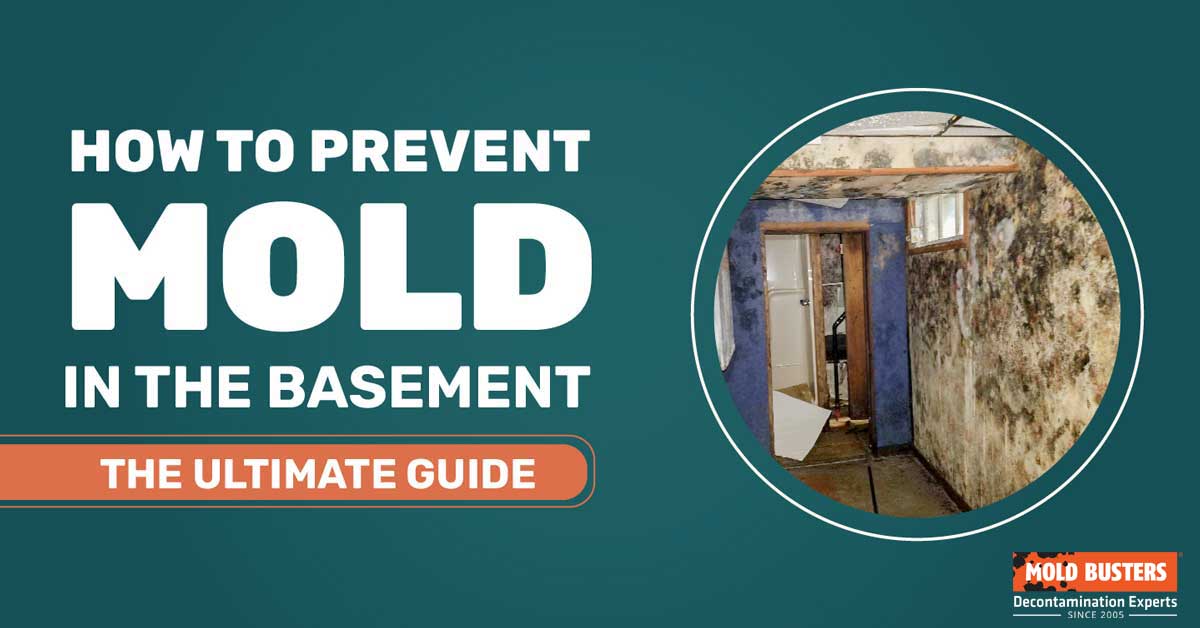
As mentioned above, the main cause of mold in the basement is excess moisture, which is not a rare situation in a basement. Whether that moisture comes from the outside or from the inside, it is very important to get to the root of the problem in order to deal with it and prevent any further complications (including mold).
So, where does the moisture, or water in a basement come from? Learn to check for mold and identify early warning signs that your basement has mold:
- Musty odors indicating hidden mold
- Visible mold and mildew growth
- Water stains on basement walls
- Peeling paint or wallpaper
- Condensation on basement pipes and windows
Understanding What Promotes Mold Growth in Your Basement
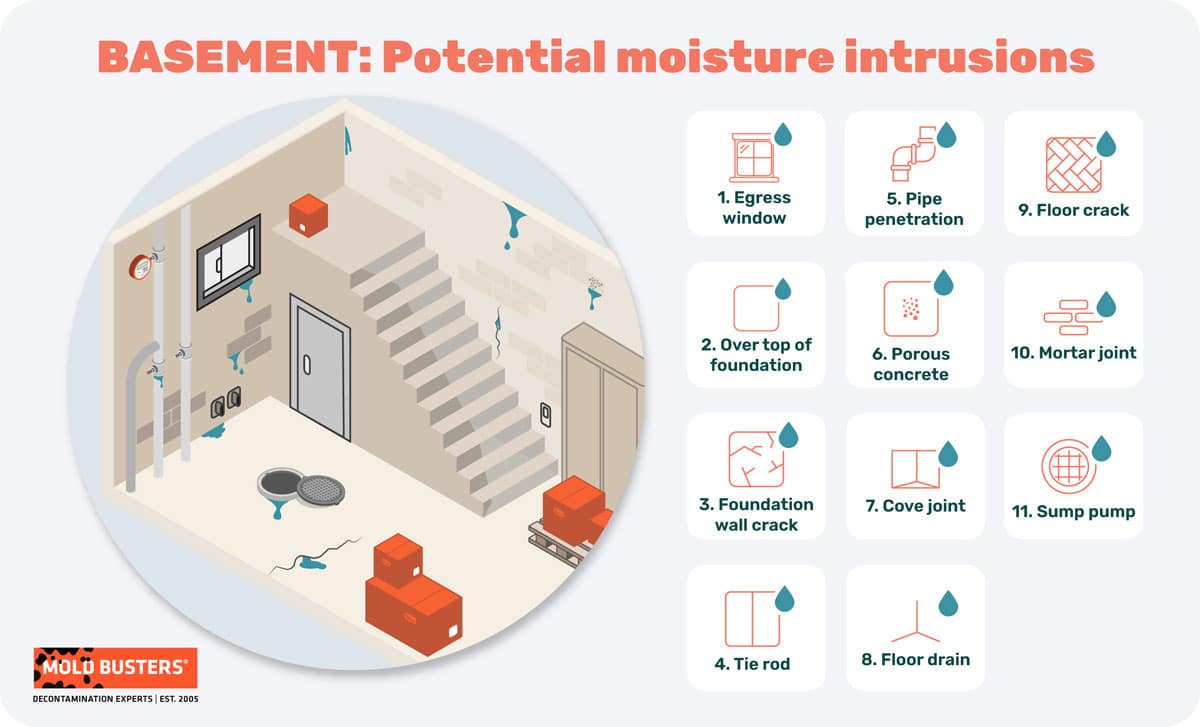
The environment for mold in your basement typically comes from two main moisture sources that help prevent or promote mold growth:
External Sources:
- Rainwater seeping through foundation walls
- Groundwater infiltration
- Basement flooding
- Poor drainage directing water away from the house
Internal Sources:
- High humidity levels creating water vapor
- Condensation on basement pipes and walls
- Daily activities (laundry, cooking)
- Inadequate ventilation in your basement

Did you know?
Only 8% of basements we have tested didn’t have presence of mold?! Find out more exciting mold stats and facts inside our mold statistics page.
Essential Steps to Prevent Mold from Growing

- Control moisture in your basement through proper ventilation
- Use waterproof materials for basement floor and walls
- Direct water away from your foundation
- Maintain proper drainage systems
- Remove existing mold spores through regular cleaning
- Monitor humidity levels to prevent condensation
- Address water damage promptly to prevent mold from spreading
Creating a Mold-Free Basement Environment
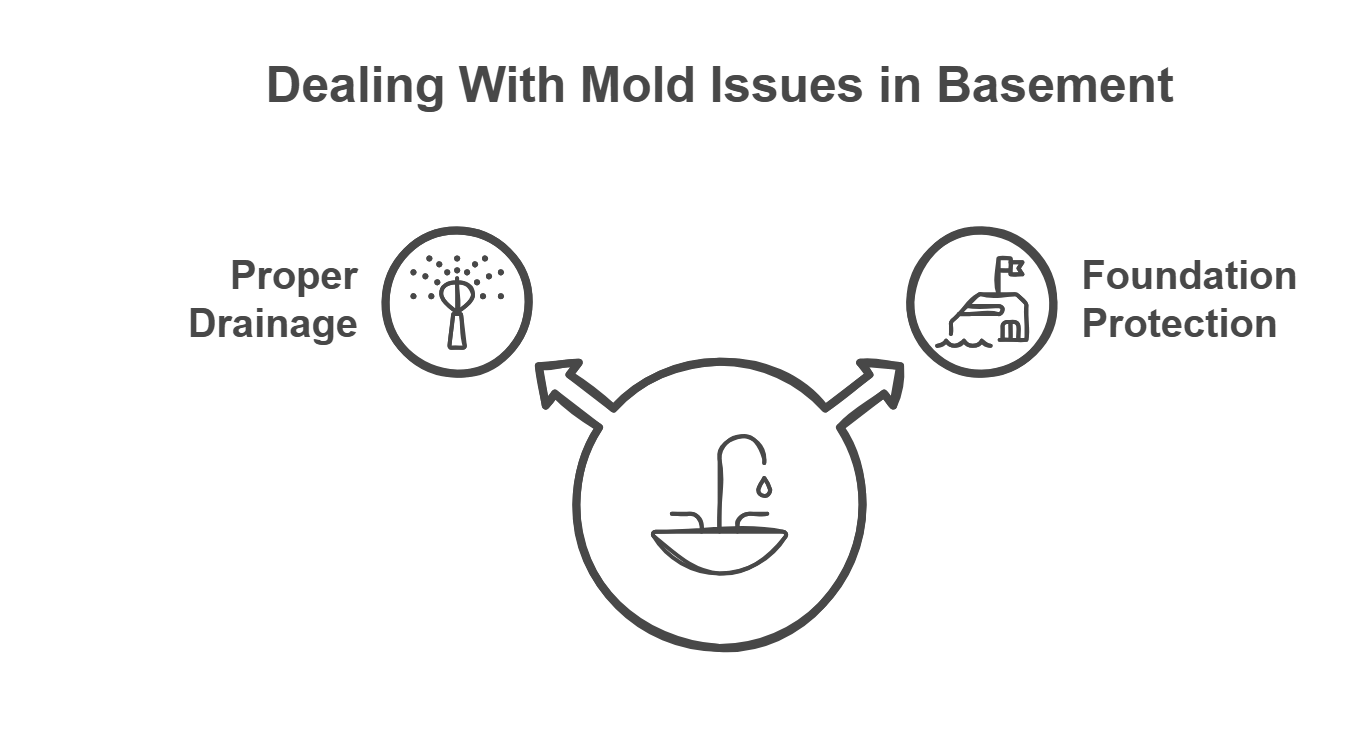
Managing External Water Sources
To prevent mold from growing in your basement, address these exterior factors:
Proper Drainage
- Ensure ground slopes away from the house
- Keep gutters clean and functional
- Extend downspouts to direct water away
- Install proper window well drainage
Foundation Protection
- Seal any basement leaks or cracks
- Apply waterproof coating to basement walls
- Install proper drainage systems
- Regular inspection for water damage
Controlling Internal Moisture
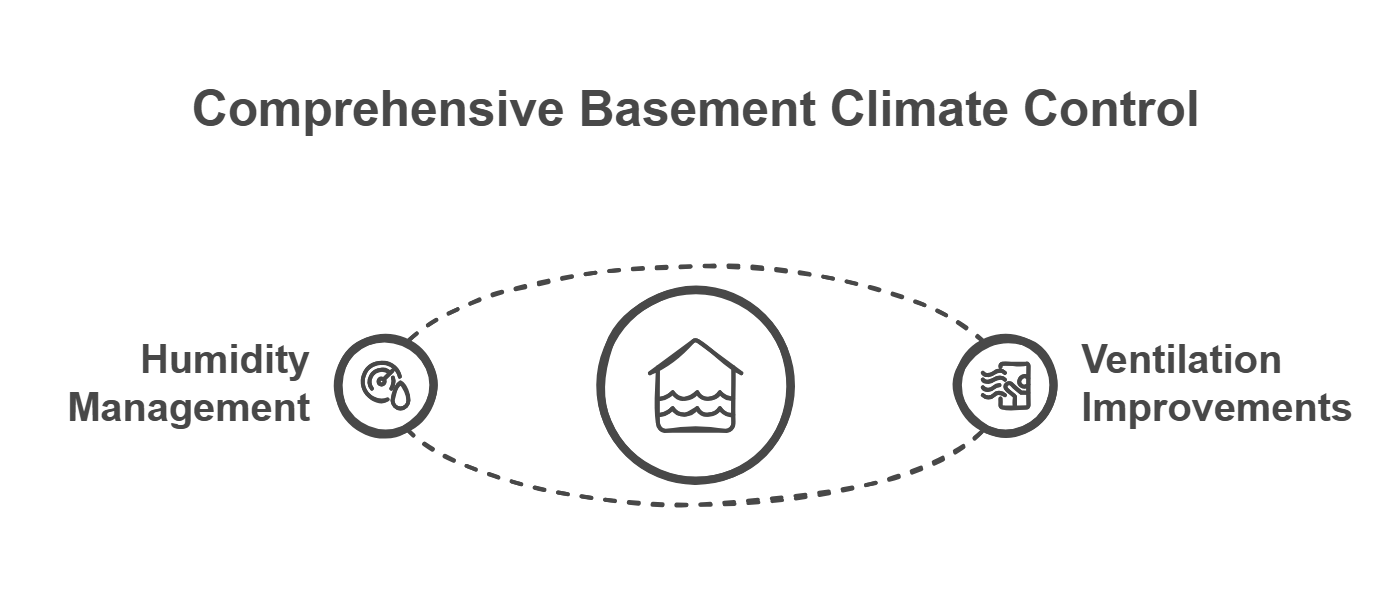
Ventilation Improvements
- Install proper air circulation systems
- Use exhaust fans to remove water vapor
- Open windows when weather permits
- Maintain consistent airflow throughout your basement
Humidity Management
- Use a dehumidifier to control moisture levels
- Monitor humidity with a hygrometer
- Keep humidity below 60% to prevent condensation
- Address moisture in your basement promptly
Insulation and Temperature Control
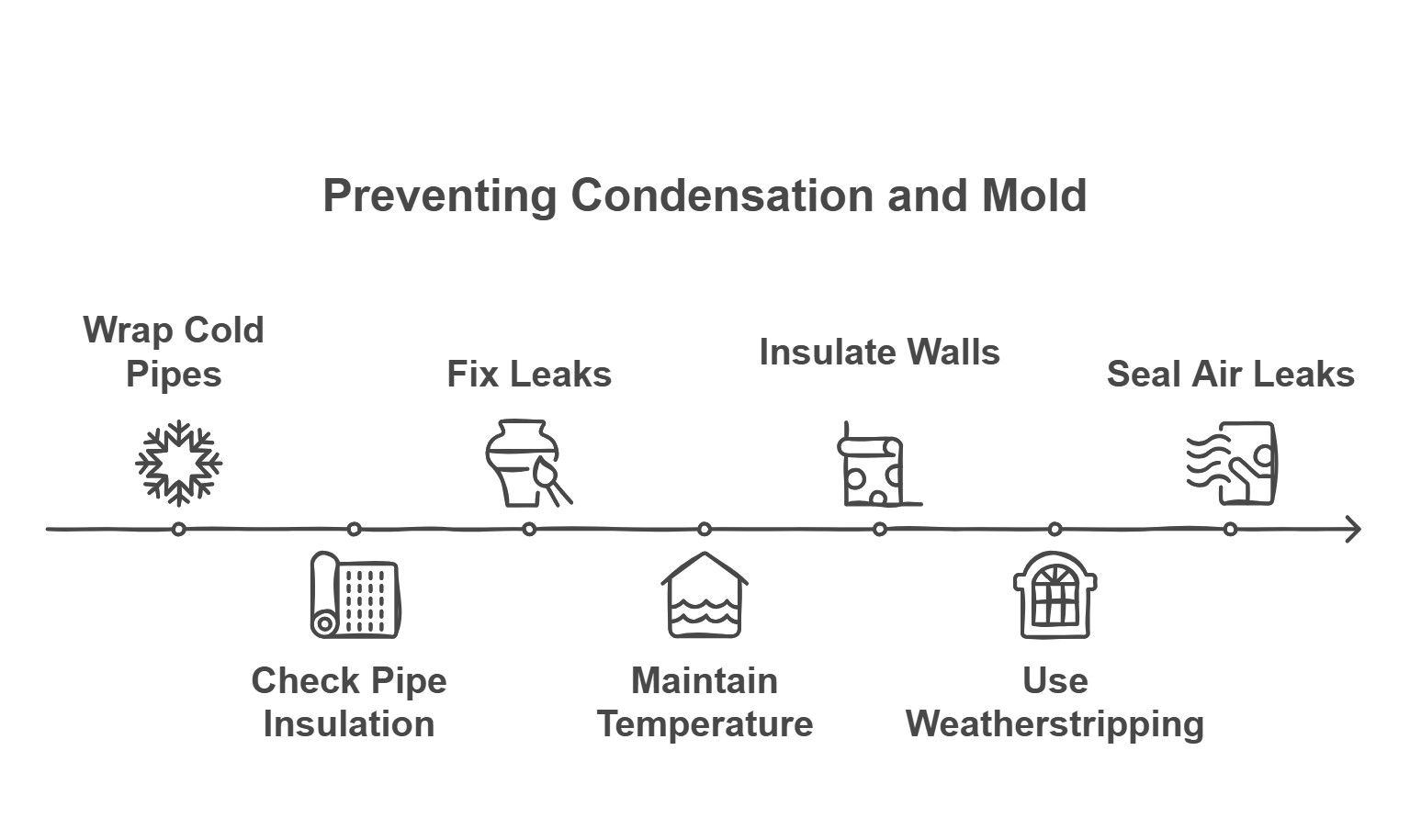
To prevent condensation and reduce the risk of mold:
Pipe Insulation
- Wrap cold basement pipes to prevent condensation
- Check pipe insulation regularly
- Fix any leaks immediately
- Maintain consistent temperature in your basement
Wall and Window Insulation
- Properly insulate basement walls
- Use weatherstripping around windows
- Seal any air leaks
- Prevent cold spots where condensation forms
Creating an Environment That Discourages Mold Growth

Declutter Your Basement
- Remove unnecessary items that can harbor mold
- Keep items away from walls
- Use plastic storage containers instead of cardboard
- Maintain good air circulation
Plant Control
- Limit or eliminate plants in your basement
- If keeping plants, monitor soil moisture
- Use anti-fungal treatments when needed
- Check regularly for signs of mold
Using a Dehumidifier to Prevent Basement Mold
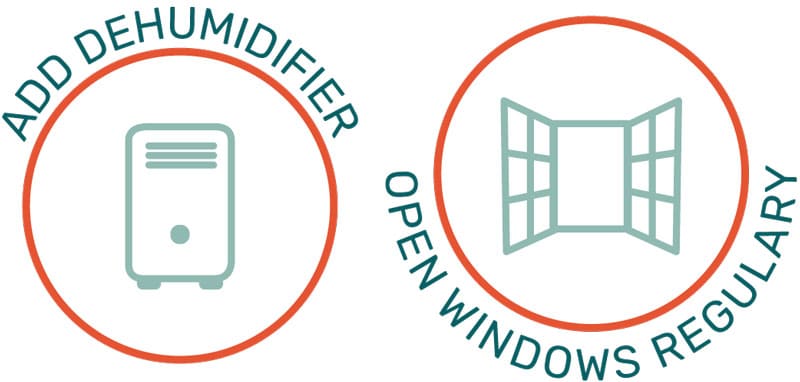
A dehumidifier is one of the most effective ways to prevent mold in basement environments. Here's how to use a dehumidifier effectively:
- Proper placement for maximum effectiveness
- Ideal humidity settings to prevent mold growth
- Regular maintenance requirements
- Size considerations for your basement space
Professional Mold Prevention Tips
Our mold experts recommend these proven strategies to keep your basement mold-free:
Regular Inspection
- Check for water damage monthly
- Monitor humidity levels daily
- Inspect basement walls and floors regularly
- Watch for early signs of mold
Moisture Control
- Install and maintain a quality dehumidifier
- Fix leaks immediately
- Ensure proper drainage away from the house
- Use moisture barriers where appropriate
Ventilation Optimization
- Install proper ventilation systems
- Use bathroom and kitchen exhaust fans
- Consider the E-Z Breathe ventilation system
- Maintain air circulation throughout your basement
Professional Basement Waterproofing and Mold Prevention
Proper basement waterproofing can help prevent water damage and reduce the risk of mold. Consider these professional solutions:
- Foundation sealing
- Drainage system installation
- Basement slab repair
- Window well protection
If you suspect there's mold in your basement, professional inspection is crucial. Our mold removal services are available in Montreal and Ottawa, including air quality testing to ensure a healthy environment.
Remember, preventing mold growth in your basement is far more cost-effective than dealing with extensive mold removal later. Regular maintenance and monitoring are key to maintaining a mold-free basement environment.
For professional mold inspection and mold testing, trust our experienced team in Montreal and Ottawa. Professional inspection can help prevent major structural damage and costly repairs in the future.
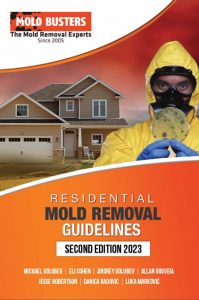
Get Special Gift: Industry-Standard Mold Removal Guidelines
Download the industry-standard guidelines that Mold Busters use in their own mold removal services, including news, tips and special offers:
Published: August 21, 2018 Updated: March 5, 2025

Written by:
John Ward
Account Executive
Mold Busters
Fact checked by:
Michael Golubev
CEO
Mold Busters
